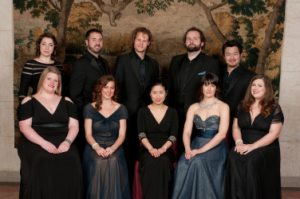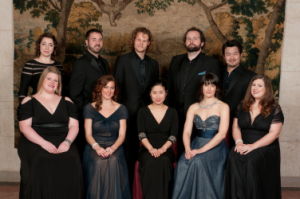
Photo by Scott Wall
Seven of the San Francisco Opera Center’s current crop of 11 Adler Fellows singers, including five newbies, held forth in the overly bright acoustic of Temple Emanu-El’s Martin Meyer Sanctuary on Monday night. Given that all but one of the newbies — bass-baritone Philippe Sly — were performing in San Francisco for the first time since their weekly lessons and more frequent coachings began in January, their generous choices of 15 tuneful arias, duets, and ensembles gave preliminary indications of who already has “star of tomorrow” tattooed on their larynx.
They were presented by the excellent Music at Meyer concert series, and their selections were introduced and accompanied on piano by San Francisco Opera Center’s wry and musically assertive director of musical studies, Mark Morash. Morash’s plot summaries, which revealed a barbed wit screaming to break through the constraints of concert formality, were especially welcome, given the absence of text and translations.
Since I missed, due to illness, mezzo-soprano Erin Johnson’s performance as Mrs. Medock in The Secret Garden, this initial hearing of the first-year Adler Fellow proved a revelation. Standing resolute, with feet planted far apart, Johnson emitted an astounding stream of glorious sound and energy in her monumental “Divinités du Styx” from Gluck’s opera Alceste. Not only were low notes solid and deep, but her highs were also emitted with a force that could knock down a house. After hearing her, I could think of no finer way to die than by sequestering myself in that house as she trumpeted forth.
Otherwise silent in the program’s first half — perhaps the sanctuary’s beams needed time to settle back on their foundation? — Johnson returned for a beautifully sung “Barcarolle” from Offenbach’s Tales of Hoffmann with returning Adler soprano Marina Harris. The blend of Johnson’s full, warm mezzo lows and Harris’ light soprano highs was marred only by the overinsistent offstage male chorus.
Their generous choices of 15 tuneful arias, duets, and ensembles gave preliminary indications of who already has “star of tomorrow” tattooed on their larynx.
The slight inequality of registers in Johnson’s second tour de force, “Son contenta di morire” from Handel’s Radamisto, suggested that she is perhaps a bit too eager to soar on high, even at the expense of a smooth gradation of dynamics between registers. That’s a shame, because the combined impact of her startling high variations in that aria and her heart-touching low tones in “Warte nur … Mitternacht,” aka the “Goodnight Quartet,” from Flotow’s Martha, confirmed the impression that her gifts are equally distributed throughout her impressive range. From this first hearing, I suspect the former apprentice in the Santa Fe Opera Apprentice Program has the goods to follow Elza van den Heever to the Metropolitan.
The Goodnight Quartet brought together, with Johnson and Harris, two first-year Adlers, tenor AJ Glueckert and bass-baritone Philippe Sly. Harris’ lovely high note at the end did much to redeem her underpowered “Come scoglio” from Mozart’s Così fan tutte, whose wild, high B-flat and less than bedrock lows, separated by several inappropriate smiles, were a puzzlement. Glueckert, whose strength and surety graced an ensemble from Così as well as duets from Massenet’s Werther and Jerome Kern’s Showboat (with returning Adler mezzo-soprano Laura Krumm), does not yet know how to infuse a romantic tenor line with the heartfelt emotion that derives, in part, from an intuitive sense of rubato (flexible tempo) and dynamic shading. Yet, in a quartet whose great beauty was diminished by mostly routine, strict time presentation, the ease of Glueckert’s vocal production bode well for his future.
We will surely be able to say, of many of the Adlers who held forth for this wonderful evening, that the future is now.
Equally encouraging was the way he lightened his tone in Kern’s “Make Believe.” His English was, for 2013, a little too proper, and his appearance not custom made for Broadway romance, though his sound was lovely. More of the same lightness would have been welcome in his Mozart (though it is possible that it was obscured by the sanctuary acoustic’s tendency to add metallic hardness to naturally ringing voices).
Krumm possesses both the looks and the theatrical potential for many a musical’s leading lady or opera’s damsel in love or in distress. Her vocal warmth was ideal for Kern and, in Mozart’s “Il core vi dono” duet from Così, captivating in her somewhat restrained capitulation to the seductively suave Sly. Also welcome was her more intense tone in Massenet’s “N’achevez pas!” duet with Glueckert. Limitations, however, surfaced in her rendition of the extremely demanding “Nobles seigneurs, salut!” from Meyerbeer’s Huguenots. Despite an extremely attractive sound lower in the range and a good trill, Krumm’s coloratura was a bit labored, lacked sufficient differentiation between notes, and was capped by an insufficiently nourished high note.
Bass-Baritone Double Whammy
For our two appealingly slender, handsome baritones, Sly and the previously unmentioned (solely for reasons of narrative flow) Hadleigh Adams, many a reader would gladly lock themselves in the same house. At 24, Sly may have lots of interpretive growth ahead of him, but he has a major instrument that seems tailor-made for his forthcoming role as Guglielmo in San Francisco Opera’s main-stage production of Così fan tutte. Not only does his voice have captivating and surprisingly mature-sounding, manly resonance lower in his range, but his onstage ease and pointed tone also indicate that he’ll carry well to the far reaches of the War Memorial.
Hopefully to come are two qualities: an ability to emit soft highs without sounding threadbare, and an even greater willingness to dive headfirst into characterization. This was true for both men in the famed patter duet “Don Pasquale! … Cheti, cheti immantinente” from Donizetti’s Don Pasquale. The patter itself was accomplished with rare alacrity and synchronized perfection — bravo! — yet the acting nonetheless lacked buffo bull and bravado.
Speaking of bull, Adams, who was a member of New Zealand Opera from 2004 to 2008 and was first runner-up in the Australian Singing Competition, has a fine, solid instrument with a most impressive range, but his Toreador Song (“Votre toast je peux vous le rendre”) from Bizet’s Carmen lacked the ravishing, meaty tone and danger that would convince many a Carmen to mount horns rather than Josés. In general, his characterizations indicated a willingness to rest on his considerable vocal laurels rather than go the extra mile. But who knows how he will sound on future occasions, when we will surely be able to say, of many of the Adlers who held forth for this wonderful evening at Music at Meyer, that the future is now?

